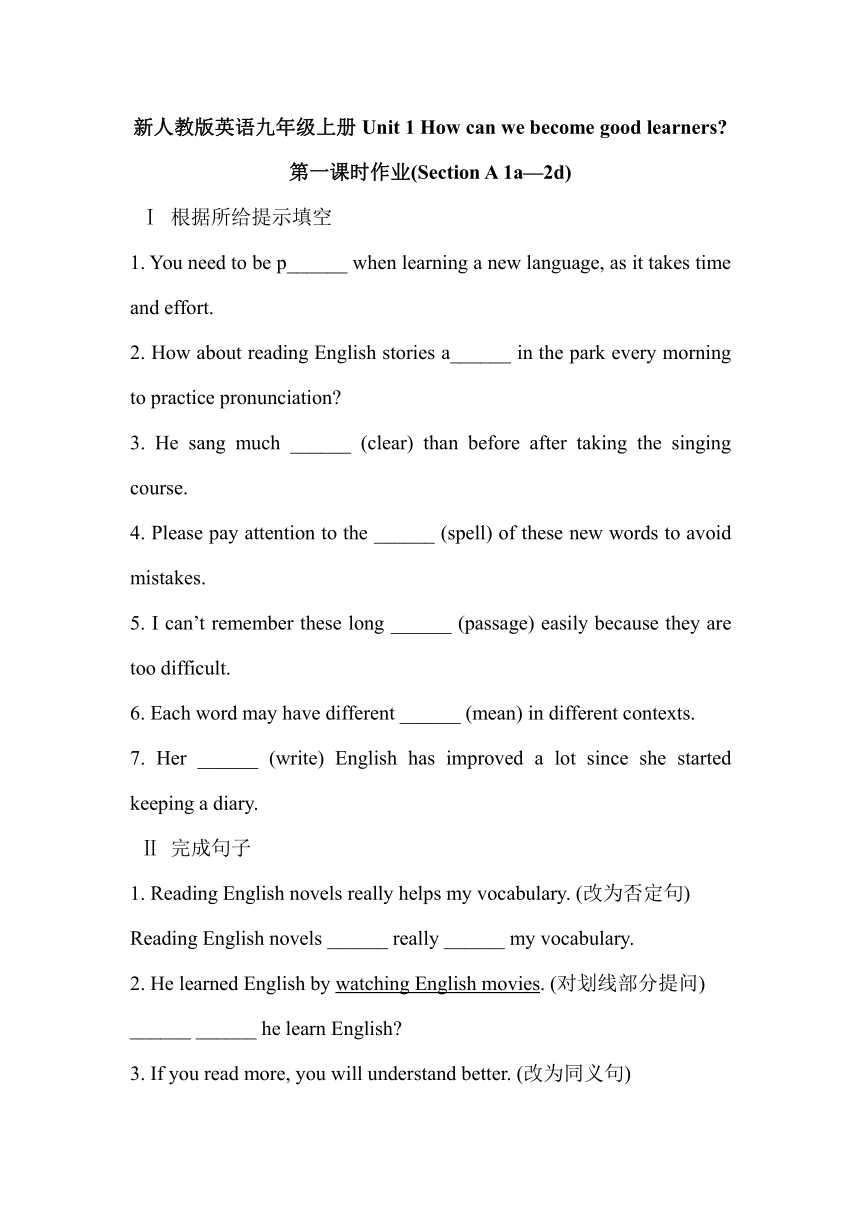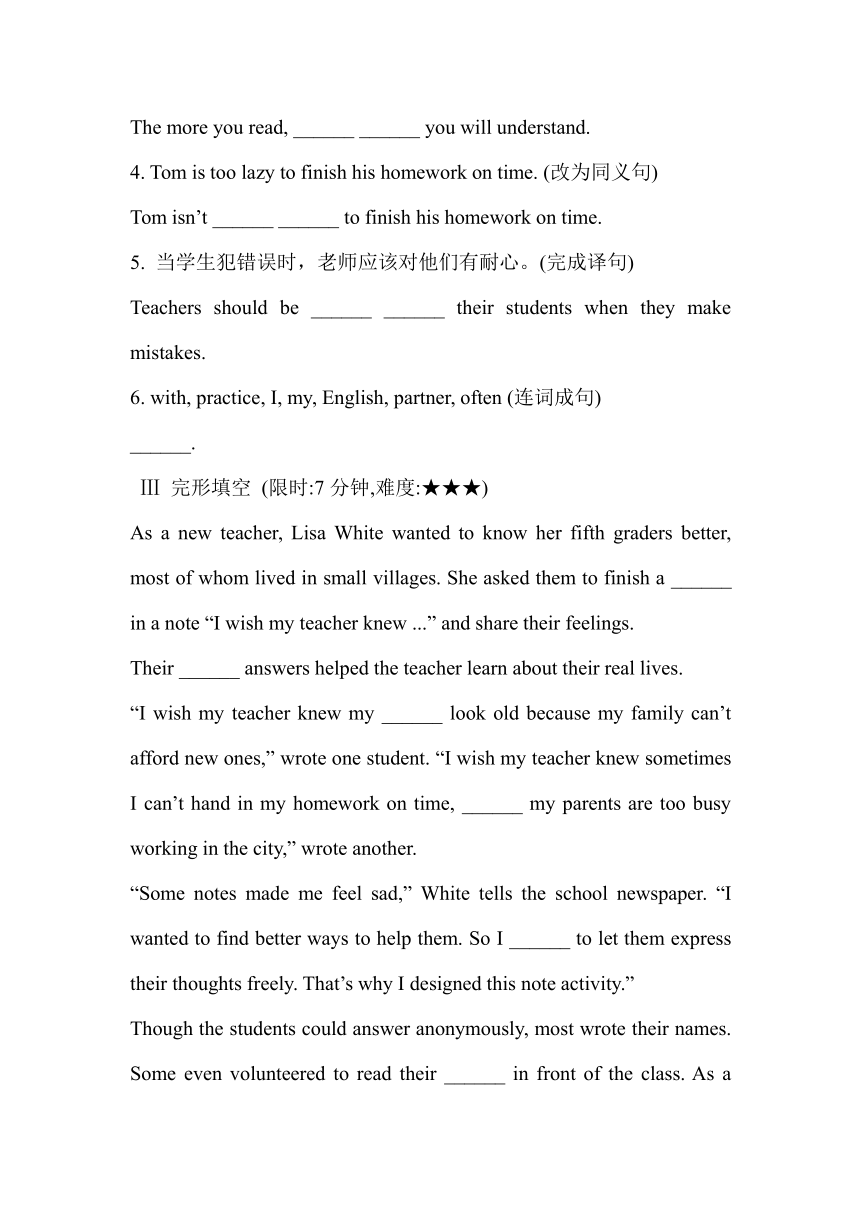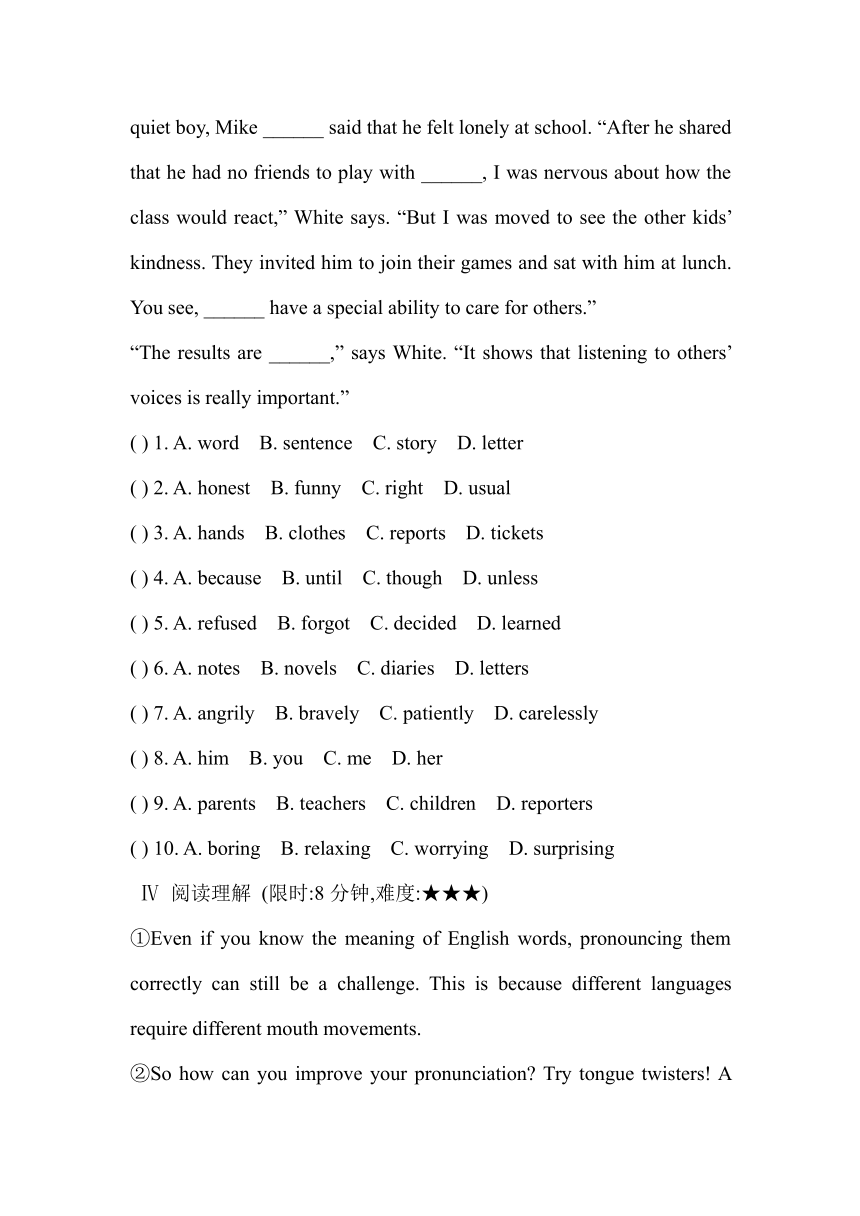人教版英语九年级上册Unit 1 How can we become good learners第一课时作业(Section A 1a—2d)(含答案)
文档属性
| 名称 | 人教版英语九年级上册Unit 1 How can we become good learners第一课时作业(Section A 1a—2d)(含答案) |  | |
| 格式 | docx | ||
| 文件大小 | 14.8KB | ||
| 资源类型 | 教案 | ||
| 版本资源 | 人教新目标(Go for it)版 | ||
| 科目 | 英语 | ||
| 更新时间 | 2025-08-07 14:59:05 | ||
图片预览



文档简介
新人教版英语九年级上册Unit 1 How can we become good learners
第一课时作业(Section A 1a—2d)
Ⅰ 根据所给提示填空
1. You need to be p______ when learning a new language, as it takes time and effort.
2. How about reading English stories a______ in the park every morning to practice pronunciation
3. He sang much ______ (clear) than before after taking the singing course.
4. Please pay attention to the ______ (spell) of these new words to avoid mistakes.
5. I can’t remember these long ______ (passage) easily because they are too difficult.
6. Each word may have different ______ (mean) in different contexts.
7. Her ______ (write) English has improved a lot since she started keeping a diary.
Ⅱ 完成句子
1. Reading English novels really helps my vocabulary. (改为否定句)
Reading English novels ______ really ______ my vocabulary.
2. He learned English by watching English movies. (对划线部分提问)
______ ______ he learn English
3. If you read more, you will understand better. (改为同义句)
The more you read, ______ ______ you will understand.
4. Tom is too lazy to finish his homework on time. (改为同义句)
Tom isn’t ______ ______ to finish his homework on time.
5. 当学生犯错误时,老师应该对他们有耐心。(完成译句)
Teachers should be ______ ______ their students when they make mistakes.
6. with, practice, I, my, English, partner, often (连词成句)
______.
Ⅲ 完形填空 (限时:7分钟,难度:★★★)
As a new teacher, Lisa White wanted to know her fifth graders better, most of whom lived in small villages. She asked them to finish a ______ in a note “I wish my teacher knew ...” and share their feelings.
Their ______ answers helped the teacher learn about their real lives.
“I wish my teacher knew my ______ look old because my family can’t afford new ones,” wrote one student. “I wish my teacher knew sometimes I can’t hand in my homework on time, ______ my parents are too busy working in the city,” wrote another.
“Some notes made me feel sad,” White tells the school newspaper. “I wanted to find better ways to help them. So I ______ to let them express their thoughts freely. That’s why I designed this note activity.”
Though the students could answer anonymously, most wrote their names. Some even volunteered to read their ______ in front of the class. As a quiet boy, Mike ______ said that he felt lonely at school. “After he shared that he had no friends to play with ______, I was nervous about how the class would react,” White says. “But I was moved to see the other kids’ kindness. They invited him to join their games and sat with him at lunch. You see, ______ have a special ability to care for others.”
“The results are ______,” says White. “It shows that listening to others’ voices is really important.”
( ) 1. A. word B. sentence C. story D. letter
( ) 2. A. honest B. funny C. right D. usual
( ) 3. A. hands B. clothes C. reports D. tickets
( ) 4. A. because B. until C. though D. unless
( ) 5. A. refused B. forgot C. decided D. learned
( ) 6. A. notes B. novels C. diaries D. letters
( ) 7. A. angrily B. bravely C. patiently D. carelessly
( ) 8. A. him B. you C. me D. her
( ) 9. A. parents B. teachers C. children D. reporters
( ) 10. A. boring B. relaxing C. worrying D. surprising
Ⅳ 阅读理解 (限时:8分钟,难度:★★★)
①Even if you know the meaning of English words, pronouncing them correctly can still be a challenge. This is because different languages require different mouth movements.
②So how can you improve your pronunciation Try tongue twisters! A tongue twister is a sentence with words that have similar sounds, making it hard to say quickly. For example: She sells seashells by the seashore.
③This twister mixes /s/ and / / sounds. It’s tricky to say, and the faster you try, the harder it gets!
④Tongue twisters are not just fun—they’re also helpful. They focus on one or two specific sounds, so you can easily find which sounds you struggle with. Then you can pick twisters that target those sounds to practice.
⑤What’s more, similar sounds need small mouth changes to be pronounced clearly. Tongue twisters make you repeat these similar sounds, training your brain to remember the right mouth movements.
⑥Practicing with a partner is great for language learning, but it’s not always possible. The best part about tongue twisters is that you don’t need a partner. Just choose the sounds you want to work on and start practicing!
⑦Here are some fun tongue twisters. Start slowly, then try to speed up:
- Peter Piper picked a peck of pickled peppers.
- Thank the other three brothers of their father’s mother’s brother’s side.
- How much wood would a woodchuck chuck if a woodchuck could chuck wood
1. 【写作手法】How does the writer develop his idea in Paragraph 4
A. By giving an example.
B. By comparing facts.
C. By listing numbers.
D. By giving a reason.
2. 【推理判断】What can we infer from the passage
A. Tongue twisters are only useful for beginners.
B. Tongue twisters help by focusing on specific sounds.
C. You must have a partner to practice tongue twisters.
D. All tongue twisters are about daily life.
3. If you find it hard to pronounce /θ/ and / / correctly, which tongue twister is best for practice
A. Peter Piper picked a peck of pickled peppers.
B. Thank the other three brothers of their father’s mother’s brother’s side.
C. How much wood would a woodchuck chuck if a woodchuck could chuck wood
D. She sells seashells by the seashore.
4. 【篇章结构】What’s the structure of the passage
A. ①/②③/④⑤⑥/⑦
B. ①②/③④/⑤⑥/⑦
C. ①/②③④/⑤⑥/⑦
D. ①②③/④⑤/⑥/⑦
参考答案
Ⅰ. 1. patient 2. aloud 3. more clearly 4. spelling 5. passages 6. meanings 7. written
Ⅱ. 1. doesn’t; help 2. How did 3. the better 4. hard - working enough 5. patient with 6. I often practice English with my partner.
Ⅲ. 1-5 BABAC 6-10 ABCCD
Ⅳ. 1-4 DBBA
第一课时作业(Section A 1a—2d)
Ⅰ 根据所给提示填空
1. You need to be p______ when learning a new language, as it takes time and effort.
2. How about reading English stories a______ in the park every morning to practice pronunciation
3. He sang much ______ (clear) than before after taking the singing course.
4. Please pay attention to the ______ (spell) of these new words to avoid mistakes.
5. I can’t remember these long ______ (passage) easily because they are too difficult.
6. Each word may have different ______ (mean) in different contexts.
7. Her ______ (write) English has improved a lot since she started keeping a diary.
Ⅱ 完成句子
1. Reading English novels really helps my vocabulary. (改为否定句)
Reading English novels ______ really ______ my vocabulary.
2. He learned English by watching English movies. (对划线部分提问)
______ ______ he learn English
3. If you read more, you will understand better. (改为同义句)
The more you read, ______ ______ you will understand.
4. Tom is too lazy to finish his homework on time. (改为同义句)
Tom isn’t ______ ______ to finish his homework on time.
5. 当学生犯错误时,老师应该对他们有耐心。(完成译句)
Teachers should be ______ ______ their students when they make mistakes.
6. with, practice, I, my, English, partner, often (连词成句)
______.
Ⅲ 完形填空 (限时:7分钟,难度:★★★)
As a new teacher, Lisa White wanted to know her fifth graders better, most of whom lived in small villages. She asked them to finish a ______ in a note “I wish my teacher knew ...” and share their feelings.
Their ______ answers helped the teacher learn about their real lives.
“I wish my teacher knew my ______ look old because my family can’t afford new ones,” wrote one student. “I wish my teacher knew sometimes I can’t hand in my homework on time, ______ my parents are too busy working in the city,” wrote another.
“Some notes made me feel sad,” White tells the school newspaper. “I wanted to find better ways to help them. So I ______ to let them express their thoughts freely. That’s why I designed this note activity.”
Though the students could answer anonymously, most wrote their names. Some even volunteered to read their ______ in front of the class. As a quiet boy, Mike ______ said that he felt lonely at school. “After he shared that he had no friends to play with ______, I was nervous about how the class would react,” White says. “But I was moved to see the other kids’ kindness. They invited him to join their games and sat with him at lunch. You see, ______ have a special ability to care for others.”
“The results are ______,” says White. “It shows that listening to others’ voices is really important.”
( ) 1. A. word B. sentence C. story D. letter
( ) 2. A. honest B. funny C. right D. usual
( ) 3. A. hands B. clothes C. reports D. tickets
( ) 4. A. because B. until C. though D. unless
( ) 5. A. refused B. forgot C. decided D. learned
( ) 6. A. notes B. novels C. diaries D. letters
( ) 7. A. angrily B. bravely C. patiently D. carelessly
( ) 8. A. him B. you C. me D. her
( ) 9. A. parents B. teachers C. children D. reporters
( ) 10. A. boring B. relaxing C. worrying D. surprising
Ⅳ 阅读理解 (限时:8分钟,难度:★★★)
①Even if you know the meaning of English words, pronouncing them correctly can still be a challenge. This is because different languages require different mouth movements.
②So how can you improve your pronunciation Try tongue twisters! A tongue twister is a sentence with words that have similar sounds, making it hard to say quickly. For example: She sells seashells by the seashore.
③This twister mixes /s/ and / / sounds. It’s tricky to say, and the faster you try, the harder it gets!
④Tongue twisters are not just fun—they’re also helpful. They focus on one or two specific sounds, so you can easily find which sounds you struggle with. Then you can pick twisters that target those sounds to practice.
⑤What’s more, similar sounds need small mouth changes to be pronounced clearly. Tongue twisters make you repeat these similar sounds, training your brain to remember the right mouth movements.
⑥Practicing with a partner is great for language learning, but it’s not always possible. The best part about tongue twisters is that you don’t need a partner. Just choose the sounds you want to work on and start practicing!
⑦Here are some fun tongue twisters. Start slowly, then try to speed up:
- Peter Piper picked a peck of pickled peppers.
- Thank the other three brothers of their father’s mother’s brother’s side.
- How much wood would a woodchuck chuck if a woodchuck could chuck wood
1. 【写作手法】How does the writer develop his idea in Paragraph 4
A. By giving an example.
B. By comparing facts.
C. By listing numbers.
D. By giving a reason.
2. 【推理判断】What can we infer from the passage
A. Tongue twisters are only useful for beginners.
B. Tongue twisters help by focusing on specific sounds.
C. You must have a partner to practice tongue twisters.
D. All tongue twisters are about daily life.
3. If you find it hard to pronounce /θ/ and / / correctly, which tongue twister is best for practice
A. Peter Piper picked a peck of pickled peppers.
B. Thank the other three brothers of their father’s mother’s brother’s side.
C. How much wood would a woodchuck chuck if a woodchuck could chuck wood
D. She sells seashells by the seashore.
4. 【篇章结构】What’s the structure of the passage
A. ①/②③/④⑤⑥/⑦
B. ①②/③④/⑤⑥/⑦
C. ①/②③④/⑤⑥/⑦
D. ①②③/④⑤/⑥/⑦
参考答案
Ⅰ. 1. patient 2. aloud 3. more clearly 4. spelling 5. passages 6. meanings 7. written
Ⅱ. 1. doesn’t; help 2. How did 3. the better 4. hard - working enough 5. patient with 6. I often practice English with my partner.
Ⅲ. 1-5 BABAC 6-10 ABCCD
Ⅳ. 1-4 DBBA
同课章节目录
- Unit 1 How can we become good learners.
- Section A
- Section B
- Unit 2 I think that mooncakes are delicious!
- Section A
- Section B
- Unit 3 Could you please tell me where the restroom
- Section A
- Section B
- Unit 4 I used to be afraid of the dark.
- Section A
- Section B
- Unit 5 What are the shirts made of?
- Section A
- Section B
- Review of Units 1-5
- Unit 6 When was it invented?
- Section A
- Section B
- Unit 7 Teenagers should be allowed to choose their
- Section A
- Section B
- Unit 8 It must belong to Carla.
- Section A
- Section B
- Unit 9 I like music that I can dance to.
- Section A
- Section B
- Unit 10 You're supposed to shake hands.
- Section A
- Section B
- Review of Units 6-10
- Unit 11 Sad movies make me cry.
- Section A
- Section B
- Unit 12 Life is full of the unexpected
- Section A
- Section B
- Unit 13 We're trying to save the earth!
- Section A
- Section B
- Unit 14 I remember meeting all of you in Grade 7.
- Section A
- Section B
- Review of Units 11-14
